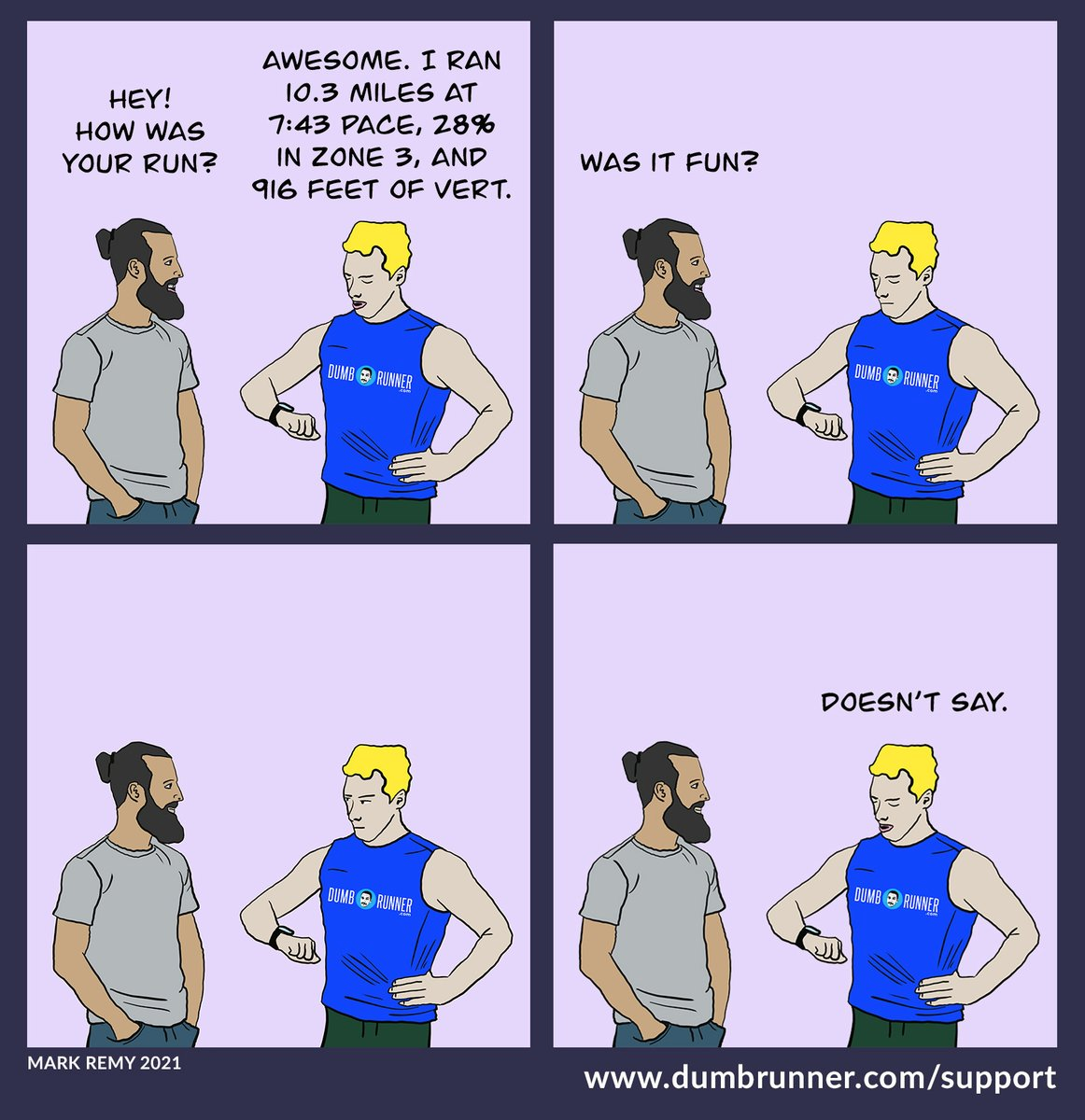Silence of Mind...
-
@dimitrios-kanellopoulos said in Silence of Mind...:
Jokes aside there is special reason that we use silence of mind, or as you might discover later, things that cannot be measured
So, it’s not a tip for “no music in this device”, right

-
@suzzlo its about that moment that you dont have to bother with equipment. having a silence of mind , things you cannot measure.
perhaps this image says more

-
@dimitrios-kanellopoulos ok, I get it… I think I’m in the last part of this journey:
- Start with any watch (Polar in my case)
- Start improving sport skills
- Suddenly you see there is a Garmin that can give you all of these
- Then see, that all these metrics doesn’t really help you and you need to focus just on someone
- Finally, you decide to buy a Suunto 9P

-
I think that never before in the history of our civilization were we so occupied in our lives like we are now. If not for the sleep, we’d be connected 24/7. Tracked, alarmed, notified. Crazy.
So, for one, having apps that are designed to help us focus on breathing or help get the idea of meditation is a good thing. But I find this is somewhat absurd and I personally couldn’t have a smartwatch for example. I like that my watch can vibrate when someone is calling me or display a text from an app that I’ll allow it to but that’s all.
Wash your hands.
Breathe.
Do a barrel roll.
Are we zombies?
Are we still in control? Can we just go offline for a moment? Enjoy the walk/run/bike? Work with the senses and forget the numbers? Like - be alive?
I like this “Silence of Mind”. Reminds me somehow of the original S5 marketing theme related to the “Flow” and some of my catharsis experiences during running. We’ll see what it brings

-
@dimitrios-kanellopoulos but suunto provides “how was it?” function, so it does say XD
-
@dimitrios-kanellopoulos this is golden

-
@suzzlo said in Silence of Mind...:
@dimitrios-kanellopoulos ok, I get it… I think I’m in the last part of this journey:
- Start with any watch (Polar in my case)
- Start improving sport skills
- Suddenly you see there is a Garmin that can give you all of these
- Then see, that all these metrics doesn’t really help you and you need to focus just on someone
- Finally, you decide to buy a Suunto 9P

That’s funny. I started with a Polar (M430) and decided I needed more information. Enter a Fenix 3 HR, soon followed by a Vantage V and then a Suunto Spartan Sport WHR Baro. The Polar has so much data, it’s mind bending, but it can’t navigate itself out of a goldfish bowl. The Garmin is so configurable it’s ridiculous, but the app is not to my taste and I keep being told to ‘Move’ when I already just stood up! The Suunto has (arguably) less metrics than either of them, but it tells me when the weather will be bad (without needing a phone connection) is pretty simple to use, and is very practical when it comes to navigation. Guess which two I’m selling and which will stay?
-
With so many people these days working long hours at desks and computers often in high pressure and stress jobs, is it such a bad thing to have a small device give us a little nudge every now and then reminding us to take a few minutes to stretch, move, and look away from the screen?
For example, just this morning I became so engrossed in a task that it was three hours before I realised I hadn’t moved or even looked away from my screen.
I used to have a Fitbit that would pester me every hour if I hadn’t done enough steps and it really worked, as I would get up and walk around for 30 seconds. It wasn’t much, but I have no doubt it helped.With the breathing, I also think it can help people. Not everyone knows how to meditate, or even how to properly relax (in fact I would go as far to say as most average people don’t know how to do this).
These guided breathing sessions can help people to relax and lower stress levels. Maybe before an important interview (or after, or both)?The great thing about these apps/services/etc is they are optional. If you can meditate then great, you don’t need it. But average Bob (sorry Bob, we love you really!) who works a 50hr week at a computer in a high stress job doesn’t know how to meditate and something like this could (i emphasise could) really help him and his welbing.
The more options there are for people to help themselves the better I think

-
"New alert: you spent few hours outdoor, go grab some fun! " ?
Picking the example of @suzzlo , havince some “peace of mind” is having also tools that are simplier/easy enough for you to use “on the go” and suit your needs, and not a zillion things.
For example the imensity of menus on the garmin makes me nervous. Everytime I need to do something I am lost there. Also it is not useful to have every feature if then it will not work ok and make you frustraded.
Curious to see what will come from here
-
@olymay said in Silence of Mind...:
The great thing about these apps/services/etc is they are optional. If you can meditate then great, you don’t need it. But average Bob (sorry Bob, we love you really!) who works a 50hr week at a computer in a high stress job doesn’t know how to meditate and something like this could (i emphasise could) really help him and his welbing.
But doesn’t that prolong the issue (working 50h) , giving some placebo comfort , rather than making Bob say it’s not ok anymore ?
-
Here’s my Silence of Mind from Cornwall, earlier this week


-
@dimitrios-kanellopoulos I find this “silence of mind” metric thing disturbing. I hesitate to imagine what perpetually measuring it would do.
We might be moving into observer effect territory.
As Heisenberg (or maybe Pinkman) once wrote:
“The examined buzz is inherently harshed.”
-
@fenr1r why would you measure that ?
-
@dimitrios-kanellopoulos It was mostly a joke - an application of quantum mechanics to the unexamined life trope. Plus watch stuff.
-
@fenr1r useful for path finding. Taking all the paths at the same time
-
I spent years with masters from asia (and other parts of the world) practicing meditation and breathing. As a typical ‘western guy’ I had not the faintest idea how deep you can get into that topic and how superficial my knowledge about breathing as a whole was. When modern trackers measure HRV metrics they can visualize the ratio of parasympathetic and symphatic activity, but in Asia this concept is known for thousands of years in the form of “yin and yang”. When you are stressed or working out your body gets “yang” and if you keep going like that, your whole system will get “too yang” which will lead to physical and psychological problems. Almost everyone in our modern, western society is too yang nowadays. Meditation and mindful breathing, bringing awareness into your body are “yin” practices and help to balance those yang lifestyle. So if people use trackers or watches to get started to become more “yin” and get back into balance, this is a first step and IMO the right way to do. Sadly, most people are not even aware of being completely out of balance, thinking that going further or working out harder will make them stronger but everything in nature that does not stay in balance will eventually perish.
-
The real question here is … what is the tool ?
The techy stuffs or us ?I’m not against tech and I’m probably a proper nerd,
 but I’m also into technology and computer stuff since a while and I’m seeing how in the last years people are turning an utility into a need
but I’m also into technology and computer stuff since a while and I’m seeing how in the last years people are turning an utility into a need -
@sartoric that goes even further: I once told one of my teachers, that “I” had problems feeling “my body” and he then replied:" Ah, so you are actually two persons?- YOU and YOUR BODY?"
 . So with an additional tool I wonder what he had said
. So with an additional tool I wonder what he had said 
But as I said: I would recommend meditation and awareness practicing to everyone and if a tools helps or motivates you in the beginning, why not. It’s the same with activity trackers. When they motivate and help yo to move more and get more active, why not?
-
@chrisa said in Silence of Mind...:
that goes even further: I once told one of my teachers, that “I” had problems feeling “my body” and he then replied:" Ah, so you are actually two persons?- YOU and YOUR BODY?" .
I love this!
Most of the people now-a-days don’t know their body (they say) and some even don’t want to look at it
-
@chrisa one of my physiotherapist kept insisting that I try to listen to my body. I’ve had no idea what he was talking about, and I regarded it as a mambo-jumbo inspired by eastern philosophy. Only recently I’ve begun discovering what it really means, how it is to experience the of “listening” to the body during the post-injury healing process and how to step back and try to observe what is hurting me.
And it’s very humbling.